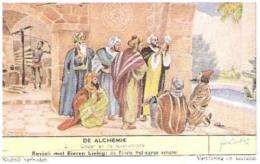Arabic chemists from the 'Golden Age' given long overdue credit

You've heard of Louis Pasteur and George Washington Carver, no doubt. And probably Joseph Priestley, one of the founders of modern chemistry. Names like Antoine Lavoisier, John Dalton, and Amadeo Avogadro may even bring a twinkle of recognition to the eye for their famous roles in establishing chemistry as a modern science.
But what about Muhammad ibn Zakariya al-Razi ("Rhazes")? Or Jabir ibn Hayyan ("Geber")? Or Abu Jusuf Yaqub ibn Ishaq al-Kindi. Huh?
"You should know them," Benjamin Huddle, Ph.D., declared in a report presented here today at the 238th National Meeting of the American Chemical Society. They're chemists from the Golden Age of Arabic-Islamic Science, which stretched from the 8th to the 13th centuries. During this era, science and medicine in Muslim countries — from southern Europe through North Africa to Central Asia and India — flourished and was unrivaled anywhere in the world. Muslim physicians and scientists made advancements that built the foundations for the emergence of modern science and medicine in Europe.
"Science in the early Muslim period is largely forgotten today in the Western world, or relegated to pseudo-science," Huddle said. "We are rediscovering the fact that from 750 to 1258 A.D. the best science in the world was being done by Arabic-speaking peoples. In chemistry we use language from the Arabs, apparatus and techniques, many chemicals (especially perfumes), and many materials."
Huddle did his research on the Golden Age, which produced a portrait of Arabic-Islamic love for learning and reverence for education and knowledge that defies popular modern stereotypes. His ACS abstract, non-technical summary, and contact information appear below.
Source: American Chemical Society (news : web)


















